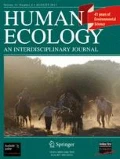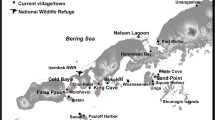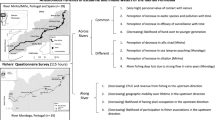Abstract
The paper describes factors influencing artisanal fisheries at the São Francisco River in Brazil as an example of the challenges of managing socially and economically valued common-pool resource systems. A rapid assessment of problems affecting São Francisco River fisheries in 10 communities was carried out in 2003, representing the upper, middle, and lower river portions. Field visits, interviews, focus group discussions and a literature survey allowed us to map socioeconomic and environmental factors important to the fisheries, including conflicts and tensions between stakeholders. Federal, state, and municipal governments, industries, farmers, hydroelectric companies, and urban and rural populations all have a stake in river use. Traditional fishers are the most disadvantaged of these stakeholders. With declining fish populations, most of the fishing communities surveyed are now poor, socially excluded, and with few alternative livelihood options. The stakeholders involved in access and use conflicts are artisanal fishers, professional fishers, sport fishers, farmers, enforcement and regulatory agencies, and hydroelectric companies. Traditional fishers have close ties to the river and its environment and they are usually not invited to contribute to resource management decisions. We recommend changes to management structures involving the fishing communities that are essential to resolve the major conflicts and to improve equity and sustainability of artisanal fisheries.




Similar content being viewed by others
Notes
defined primarily by the low level of energy used in the technology employed
Of course, such communities have also many weaknesses such as practicing predatory fishing, but we deliberative chose to focus our research on strengths that may contribute to co-management assuming that communities’ weaknesses will be dealt with during the phase of building community capacity for co-management as proposed by the WFT project mentioned at the beginning.
Fish species that undergo extensive seasonal migrations, usually as large schools, from feeding habitats to upstream spawning locations.
SEAP was created in 2003, shortly before the survey, but fisheries development and regulations responsibilities have varied between the Agriculture and Environment ministries for many years
The survey of this study triggered meetings in Minas Gerais between fishing organizations, IEF and IBAMA that by 2006, through follow-up activities of the project and its partners, have led to agreements between IBAMA and IEF for joint compatible regulations, developed participatively with the fishing community and enforced by an environmentally oriented fraction of the Military Police, which are recently becoming involved in community-based policing principles. Field implementation of these policy advances, however, was still slow.
The “decreto” prepared for the implementation of the new law was released shortly after this survey and once more prohibited fishing nets. The contacts between the police and IEF forged for this survey and associated project managed to overturn this aspect of the decreto in a participatory policy meeting, as well as defeating the issue again when it subsequently appeared in the published version of the decreto through a “bureaucratic error”.
Monthly minimum wage set by the government was equivalent to US$72 at the time of the survey.
References
Berkes, F. (ed.) (1989). Common Property Resources: Ecology and Community-based Sustainable Development. Belhaven Press, London.
Berkes, F. (2002). Cross-scale institutional linkages: Perspectives from the bottom up. In Ostrom, E. et al. (eds.), The drama of the commons. National Academy Press, Washington, pp. 293–321.
Berkes, F. (2003). Alternatives to Conventional Management: Lessons from Small-scale Fisheries. Environments 31(1): 5–19.
Berkes, F., Mahon, R., McConney, P., Pollnac, R., and Pomeroy, R. (2001). Managing Small-scale Fisheries: Alternative Directions and Methods. International Development Research Centre, Ottawa.
Bromley, D. W. (ed.) (1992). Making the Commons Work: Theory, Practice, and Policy. ICS Press, San Francisco.
Chambers, R. (1980). Rapid Rural Appraisal: Rationale and repertoire. IDS Discussion Paper (Brighton) (N.155).
Diegues, A. C. (1995). Povos e Mares: leituras em sócio-antropologia marítima. Universidade de São Paulo, Brazil. NUPAUB, São Paulo.
Feeny, D., Berkes, F., McCay, B. J., and Acheson, J. M. (1990). The Tragedy of the Commons: Twenty-two Years Later. Human Ecology 18: 1–19.
Felicidade, N., de Mendonca, S. A. T., Leme A. A., Goncalves, M. C., Martins, R. C., and Felix, S. A. (2001). Condições de vida e trabalho do pescador profissional da bacia do Alto/Médio São Francisco. In Felicidade, N., Martins, R. C., and Leme, A. A. (eds.), Uso e Gestao dos Recursos Hídricos no Brasil. RiMa, São Carlos, pp. 187–204.
Foster, M., and Mathie, A. (2003). Situating asset-based community development in the international development context. [Online] URL: http://www.stfx.ca/institutes/coady/about_publications_new_situating.html (accessed: 07.07.2007).
Godinho, H. P., and Godinho, A. L. (eds.) (2004). Águas, peixes e pescadores do São Francisco das Minas Gerais. Belo Horizonte, CNPq/PADCT, Editora PUC Minas.
Gutberlet, J., and Seixas, C. S. (2003). Rapid socio-economic assessment of fishing communities at the São Francisco River in Brazil. Report prepared for World Fisheries Trust, Victoria, September 2003.
Hardin, G. (1968). The Tragedy of the Commons. Science 162: 123–128.
Jiménez, L., Godinho, A. L., and Petrere Jr., M., (2004). As desovas de peixes no alto-médio São Francisco. In Godinho, H. P., and Godinho, A. L. (eds.) Águas, peixes e pescadores do São Francisco das Minas Gerais, Belo Horizonte, CNPq/PADCT, Editora PUC Minas, pp. 369–383.
Kalikoski, D. C., Almudi, T., and Seixas, C. S. (2006). O estado da arte da gestão compartilhada e gestão comunitária da pesca no Brasil. Revista Jirau, 15: 14–16. ProVárzea, IBAMA. [Online] URL: http://www.ibama.gov.br/provarzea/index.php?id_menu=167 (accessed 07.07.2007).
Kretzmann, J., and McKnight, J. (1993). Building Communities from the Inside Out. ACTA Publications, Chicago.
Mahon, R. (1997). Does Fisheries Science Serve the Needs of Managers of Small Stocks in Developing Countries? Canadian Journal of Fisheries and Aquatic Science 54: 2207–2213.
Markey, S., Vodden, K., Ameyaw, S., Pierce, J., and Roseland, M. (2001). Understanding Community Capacity: Planning, Research and Methodology. In The Journal of Aboriginal Economic Development 2(1): 43–55.
Martin, A., and Sherington, J. (1997). Participatory Research Methods Implementation, Effectiveness and Institutional Context. Agricultural System 55(2): 195–216.
McCay, B. J., and Acheson, J. M. (eds.) (1987). The Question of the Commons: The Culture and Ecology of Communal Resources. University of Arizona Press, Tucson.
McCully, P. (2001). Silenced River: The Ecology and Politics of Large Dams. Zed Books, New York.
Montenegro, S. C. S., Nordi, N., and Marques, J. G. W. (2001). Contexto Cultural, Ecológico e Econômico da Produção e Ocupação dos Espaços de Pesca Pelos Pescadores de Pitu (Macrobrachium Carcinus) em um Trecho do Baixo São Francisco, Alagoas-Brasil. Interciência 26(11): 1–7.
Nielsen, J. R., Degnbol, P., Viswanathan, K. K., and Ahmed, M. (2002). Fisheries Co-management—An Institutional Innovation. Perspective and Challenges Ahead. IIFET 2002 Proceeding. Paper 216.
Ostrom, E. (1990). Governing the Commons. The Evolution of Institutions for Collective Action. Cambridge University Press, Cambridge.
Ostrom, E., and Schlager, E. (1996). The formation of Property Rights. In Hanna, S. S., Folke, C., and Mäler, K. (eds.), Rights of Nature: Ecological, Economic, Cultural, and Political Principles of Institutions for the Environment. Island Press, Washington, D.C., pp. 127–156.
Ostrom, E., Dietz, T., Dolsak, N., Stern, P. C., Stonich, S., and Weber, E. U. (eds). (2002). The Dramas of the Commons. National Academy Press, Washington, DC.
Sato, Y., and Godinho, A. L. (1988). Tucunaré—um peixe exótico na represa de Três Marias. In Coletânea de Resumos dos Encontros da Associação Mineira de Aqüicultura (AMA): 1982–1987. Brasília. CODVASF, pp. 92–93.
Sato, Y., and Godinho, H. P. (2003). Migratory fishes of the São Francisco River. In: Carolsfeld, J., Harvey, B, Baer, A., and Ross, C. (eds.), Migratory Fishes of South America. Biology, Fisheries and Conservation Status. World Fisheries Trust, World Bank, and IDRC, pp. 199–232.
Suassuna, J. (2005). Erros da Transposição. Fundação Joaquim Nabuco. [Online] URL: http://www.joaosuassuna.hpg.ig.com.br/. (accessed 07.07.2007).
Thé, A. P. G. (1999). Etnoecologia e Produção Pesqueira dos Pescadores da represa de Três Marias, Minas Gerais. Dissertação de mestrado, PPG-ERN, UFSCar, São Carlos. SP. 122p. (Masters Thesis dissertation).
Thé, A. P. G. (2003). Conhecimento Ecológico, Regras de uso e Manejo Local Dos Recursos Naturais Na Pesca Do Alto-Médio São Fransciso, MG. Tese de Doutorado, PPG-ERN, UFSCar, São Carlos. SP. 199p. (Doctorate Thesis dissertation).
Thé, A. P. G., and Nordi, N. (2006). Common Property Resource System in a Fishery of the São Francisco River, Minas Gerais, Brazil. Human Ecology Review 13(1): 1–10.
Wilson, J. A., Acheson, J. M., Metcalfe, M., and Kleban, P. (1994). Chaos, Complexity and Community Management of Fisheries. Marine Policy 18(4): 291–305.
Acknowledgements
We thank all fishers, their families, and communities, as well as the municipal and government agents that participated in the surveys, including Raimundo Marques of the Federation of Professional Fishers, Barbara Johnsen and Carlão of the Environment Secretary of Três Marias, and Sineide Montenegro and Fatima Sá of the Federal University of Alagoas (UFAL). The fieldwork was supported by World Fisheries Trust, the Federal University of São Carlos (UFSCar), and the Federation’s Peixes, Pessoas e Agua Project through CIDA funding, with counterpart support of field activities by the city of Três Marias and UFAL. Ana Thé was supported by FAPESP and the Post-graduate program in Ecology and Natural Resources of UFSCar.
Author information
Authors and Affiliations
Corresponding author
Rights and permissions
About this article
Cite this article
Gutberlet, J., Seixas, C.S., Thé, A.P.G. et al. Resource Conflicts: Challenges to Fisheries Management at the São Francisco River, Brazil. Hum Ecol 35, 623–638 (2007). https://doi.org/10.1007/s10745-007-9132-7
Published:
Issue Date:
DOI: https://doi.org/10.1007/s10745-007-9132-7




